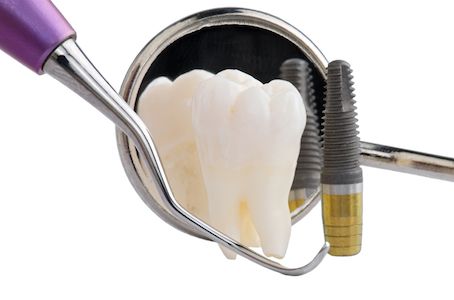For patients with missing teeth, a beautiful smile may feel like a pipe dream. Fortunately, dentists have been using dental implants to help improve grins for generations. The thought of implanting metal into the jaw is enough to make some people shy away from such procedures. With the help of some important facts about dental implants, patients can better understand how the treatment can truly transform their lives.
Residents in the Richardson, TX area know that they need a dentist they can trust. At the offices of Meredith Davis, DDS (your local Richardson dentist office), our staff is ready to help you make the right decisions about your oral care. If you have any questions about dental implants and or any other treatment options, call us today for more information.
The Fundamentals of Dental Implants
Natural teeth are embedded into the jawbone with strong root systems that both support dentition and anchor it in place. While dentists prefer to save as much of a patient’s original dentition as possible, that goal cannot always be achieved. In essence, a dental implant is a surgically installed metal root for a false tooth.
Made of titanium, the implants are seated directly into the jaw. Metal bonds easily with bone during a process called osseointegration, which anchors the false root in place. A crown, or a false tooth that usually resembles your natural dentition in size, shape, color, and texture, is inserted onto the implant after it heals. The crown can be constructed from a variety of materials, each with its own advantages.
- Porcelain: These crowns look and feel just like natural teeth, and can be easily color-matched to surrounding dentition. However, they can be fragile and may need to be replaced sooner than other options.
- Metal/Stainless Steel: Gold teeth aren’t just for pirates anymore! Non-reactive metals work great for false teeth, and their strength and durability illustrate why they are a common choice for crowns. Even so, they are rather noticeable since their color can’t be changed.
- Porcelain/Metal Composites: A metal core with a porcelain overlay gives you the strength of one with the look of the other, though porcelain still may chip under extreme stresses. The metal underlay might also become visible as time passes and gums recede, making a dark line appear at the gum line..
- Resin/Ceramic: While a less expensive alternative, resin and ceramic crowns look much like porcelain varieties but are much less durable. Conversely, the materials are much easier to work with and some dentists might even be able to fabricate them in their own offices.
Each option will have a different effect on your renewed smile. When you discuss the treatment with your doctor, it helps to relay your concerns about food and how the implant and durability of crowns can affect your every-day life. Once the treatment is complete, your permanent false teeth will act much like your real ones. Excellent oral hygiene will help to ensure their implants and crowns remain healthy.
Candidates for Implants
Permanent false teeth aren’t the right answer for everyone. There are mitigating factors that may make it less likely that some patients will find the treatment appropriate. In some situations, dentures or bridges may be a better alternative. Patients who are excellent candidates for the procedure will meet a series of requirements, including:
- Missing teeth
- Fully developed jawbone
- Have good oral health
- Ability to accept bone grafts (if necessary)
- Are unable (or unwilling) to wear dentures
- No health conditions that interfere with recovery
- Ability to devote several months to the process
- Don’t smoke tobacco
Jawbone health is very important to implant surgery. Patients who do not have enough material in their jaws for osseointegration will need a bone graft to give the titanium implant something to hold on to. In addition, some ailments may make it difficult or impossible for the bone to recover, making implant surgery unavailable to those patients.
The Implant Procedure
Installing dental implants takes more than just surgery. Initial appointments and aftercare are necessary to fully allow the implant to heal and secure itself to the jawbone. The basic steps for the treatment, from start to finish, are as follows:
Preparation - To get ready for the procedure, your dentist will give you a comprehensive examination. This will include x-rays to determine what the underlying bone structure looks like as well as removing and repairing other issues that may be present as well. This determines if your jaw is healthy enough for osseointegration and to assess any other problems that may interfere with the surgery.
Procedure - The actual implantation is an outpatient surgery, meaning you will be heading home once your dentist has finished. The procedure involves seating the implant below your gum line, which is sealed over the affected area. If a bone graft is required, it may take place on a separate visit and will need some extra time to heal. A partial denture or temporary crown may be used to fill the space in dentition, but this is only a temporary stopgap until recovery is complete and you’re ready for the permanent crown.
Recovery - Post-surgery you’ll need to wait several weeks for osseointegration to take effect. Sore gums and swollen cheeks are a common occurrence after implantation, but they should lessen in the coming days. Most patients say that the accompanying pain is akin to tooth extraction, and over-the-counter analgesics such as ibuprofen are suitable for dealing with the discomfort.
Abutment - Once your dentist is satisfied you are healing properly, the abutment is put into place. This piece acts as the connector for your crown, giving it a spot to be securely fitted into place. Depending on the number of teeth that need to be replaced, one or two implants might act as a platform for a single crown or a bridge of multiple false teeth.
Crown- When everything has healed nicely, you’ll be ready to have your crowns fitted into place. Your dentist will help you match the color to your natural teeth, and an off-site lab will have created false caps using molds of your original dentition. Depending on the material selected, these crowns can last a long while.
An Effective Solution
One of the reasons why dental implants are so ubiquitous is how well they work. Depending on where the surgery occurs in the jawbone, dentists find that they can have over a 98% success rate. This means that patients who are good candidates may look forward to a lifetime of stunning smiles if they pay attention to their oral hygiene.
Because it is a highly successful procedure, some of the most important facts about dental implants are their advantages over other treatment options. Some of those benefits include:
- Improved self-esteem from a beautiful smile
- More comfortable when compared to dentures
- Promotes bone growth
- More convenient (nothing to lose)
- More confidence when chewing, biting, and eating
- Improved speech
- Long-lasting implants/durable crowns
While the implant is permanent and can stay secure in your jawbone over the course of your life, false teeth do have a propensity to wear out. Porcelain crowns are somewhat fragile and last around 7 years, while metal options have a much longer lifespan. Even so, with the right care patients will find their dental implants and crowns remain in excellent condition for a long time.
Potential Complications and Drawbacks
One of the most prohibitive aspects of dental implant treatment is cost, As of now, most insurance plans do not cover implant surgery as an option. Don’t let that stand in the way of your beautiful smile, as financing options may be available that suit your needs. If budgetary issues are a great concern, you may wish to consider less expensive crowns or a different type of treatment altogether.
Dental implants may not be the best choice for those wishing to avoid any type of surgery. Also, allergies, blood disorders, and bone conditions might stand in the way of being accepted for the procedure. Once installed, the likelihood of the implant being damaged is quite low, though with enough pressure it is still possible to fracture the titanium rod. This would cause damage to the jawbone and surrounding nerves, though the event of this happening is rare.
Smoking plays an important role in the success rate of dental implants. Tobacco products can interfere with the healing process and might even cause infections to erupt while the implant is bonding with your jawbone. If a beautiful smile isn’t with tossing those cigarettes into the trash, then this particular treatment is probably not suited to your lifestyle.
The choice to have dental implant surgery should be an informed one. While it is a safe and effective procedure, lingering doubts might make some patients shy away from one of the most effective treatments for missing teeth available. If you would like to learn more about the benefits of dental implants, call us to schedule a consultation. The team at Meredith G. Davis, DDS is ready to help bring you a smile that will have you grinning from ear to ear!


